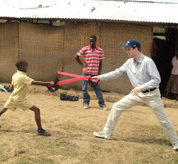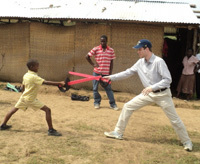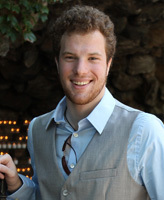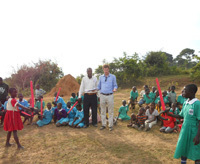

The University’s world-renowned fencing program brought student-athlete Alex Coccia to Notre Dame. By the end of his freshman year, he helped bring fencing around the world—specifically, to a group of schoolchildren in Uganda.
“It was pretty incredible,” says the junior Africana studies major. “I love East Africa—and I now have a greater understanding of that community. Going there even informed my views of community and relationships back here.”
A year later Coccia, who minors in peace studies, returned to Africa, this time investigating the legacy of reconciliation in post-genocide Rwanda.
His experiences in Africa were supported in part by the Glynn Family Honors Program, a rigorous course of study blending the humanities and sciences. The program makes special seminars, field trips, and mentoring opportunities available to a select group of the most promising scholars of each incoming class at Notre Dame, and guarantees students at least one summer’s worth of funding to conduct original research.
Enlightening Experiences

Coccia spent his first year on campus taking a series of small, seminar-style courses with the other Glynn honors students before selecting his own major and minor.
“I chose Africana studies because I took the intro class and loved it,” Coccia says. “It challenged a lot of my preconceived notions. The major also gives you the tools to challenge your own socializations, to challenge your own biases and prejudices, and understand your own worldview more deeply.”
Here, too, the Glynn program provides valuable support, he says. “We all go off into our different majors, so when we reconvene it’s interesting to get a different perspective,” says Coccia. “I’ll come at conversations from an Africana Studies perspective, someone else comes from a physics perspective. It’s a community very open to dialogue and to sharing interests.”
Contemplating a topic for his senior thesis, Coccia spent time discussing his interests with faculty mentors and then decided to focus on an analysis of the Gacaca Court System in Rwanda.
“The courts were set up after the genocide in an effort to be sort of a transitional justice, a restorative justice model,” Coccia says. “My question is: has this focus on reconciliation had an effect on the actual development of communities? What is the relationship between reconciliation and development in post conflict societies?”
Coccia, who is also involved in the International Scholars Program in Notre Dame’s Kellogg Institute for International Studies, worked with a translator and conducted case studies and interviews in a small Rwandan community during summer 2012.
“I found that many people, when asked about reconciliation, talk in economic terms,” he says. “The other thing that was interesting is there are cooperatives with pooled resources and labor within communities. Some would be set up for the purpose of reconciliation; some would be set up solely for the economic gain. And so it was interesting to see which ones failed and which ones didn’t.”
Engagement Beyond the Classroom

Coccia is now working on turning this research into a senior thesis, with guidance from professors within his major and who teach in the Glynn program.
“Within the honors program, there are such small classes it easy to reach out to professors,” he says, “And the program really promotes engagement with professors outside of class.”
Wrapping up his junior year, Alex Coccia already has his hands full as the University’s incoming student body president, but that hasn’t stopped him from thinking about his post-graduation plans.
“I’m interested in human rights law,” he says. “I’ve always been interested in law as the system in which society operates, and I think having that background is important when we’re dealing with structural injustices.”
Regardless of where the next year takes him, Coccia says the relationships he built and the unique experience of the College’s Glynn program have given him invaluable tools.
“The cultural and academic experiences it provides are great. And especially with the research,” he says, “you need the ability to go into new situations with an open mind and a willingness to engage with people.”
Learn More >
- Glynn Family Honors Program
- Department of Africana Studies
- Kroc Institute for International Peace Studies
- Kellogg Institute International Scholars Program
- Arts and Letters senior thesis page
- Video: Alex Coccia and Fields of Growth Fencing Program
- Related story: Teaching, Serving, Fencing…Alex Coccia’s Journey In East Africa
- Related story: Arts and Letters Students to Lead Notre Dame Student Body
Originally published by Eileen Lynch at al.nd.edu on March 26, 2013.